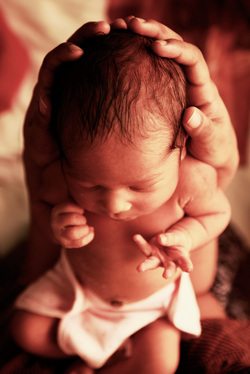
Beyond that antiseptic-sounding name, however, there is little to grant any comfort; little to explain; little to provide a clue as to how it could have been prevented.
For many along the Wasatch Front this week, questions have been swirling like the wind, and answers have been just as difficult to pin down.
How could someone neighbors describe as a great person, someone they let babysit their kids and who made cookies for them, be a monster who killed six of her newborn babies, which she reportedly carried in secrecy, and disposed of their bodies, along with a seventh allegedly stillborn, in boxes she kept in the garage?
This is just one of the questions surrounding the case of
| | Megan Huntsman, formerly of Pleasant Grove, whose name and frenzied mug shot have been thrust into our lives. The children reportedly were born at various intervals between 1996 and 2006, without anyone apparently noticing she was pregnant, although some neighbors have said she appeared at times to gain weight. And yet she has three daughters, 14, 20 and 22, whom she allowed to live and who seem to have been raised normally — also presumably without knowledge of what happened. We care about this story not just out of morbid curiosity for its sordid details. It strikes a blow to a particularly vulnerable place in our emotions. Sure, Utahns value families and, by extension, children. But this goes far beyond any local peculiarities. Human beings tend to have tender feelings toward the most vulnerable among us, and none are as helpless as newborns. We also tend to subconsciously evaluate crime stories to see whether we might be vulnerable. Few things are as disturbing as normal-seeming people who do unthinkable things. And yet, while neonaticide is relatively rare, it may happen more frequently than we care to know. Putting it in shockingly stark terms, the Sydney Morning Herald in Australia reported several years ago that, “The day you are born is the day you are most likely to be the victim of a homicide. This cheerless statistic holds true whether you live in Stockholm or South Yarra. The perpetrator will almost certainly be your mother.” Writing three years ago in Forbes Magazine, Diane Fanning focused on the case of Lindsey Brooke Lowe, a 25-year-old who gave birth to twins and then suffocated them. As with Huntsman, no one knew she had been pregnant, but her father found the bodies in a laundry basket in her bedroom. Fanning quoted Dr. Phillip Resnick of the Case Western University School of Medicine in Cleveland, who wrote that few of the women who commit neonaticide “have long term psychological problems but, instead, their mental functioning became abnormal during pregnancy.” They experience “a mental malfunction called affective denial.” She also quoted E.L. Atkins, who wrote in the American Journal of Forensic Psychology that new mothers “usually commit the act without any premeditation, acting in a state of impulsive panic and, as such, are no threat to society…” Utahns have seen this before. In one high-profile example, in 1998, a young woman in Cottonwood Heights hid her pregnancy, then panicked and stuffed the baby in a dresser drawer. But, of course, that case and the clinical explanation don’t seem to fit the profile of a 39-year-old mother of three who apparently confessed to having done this again and again, seven separate times. It’s hard to believe these all were impulsive acts. This sounds more like a French woman four years ago who was found to have killed eight of her own babies and buried them in the garden. And so the search for answers continues. We have little choice but to mourn for the lives that might have been; the laughter that never came. We have little recourse but to resolve to be more involved as neighbors and friends; more anxious to offer help and reassurance when we see someone on the edge of desperation. It won’t prevent every instance of a crime that appears to have plagued civilization since its earliest days, but it is the only logical response to the feeling of helplessness. |

 RSS Feed
RSS Feed

